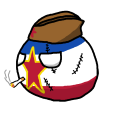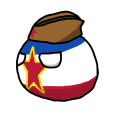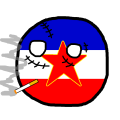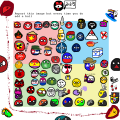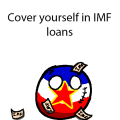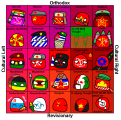Titoism is an ![]() authoritarian and
authoritarian and ![]() market socialist ideology. It's located in the
market socialist ideology. It's located in the ![]() Authoritarian-Left quadrant of the political compass, around the center of the quadrants Y axis and the third quarter from the center of the quadrants X axis. It believes in uniting ethnic and religious identities of the Balkans, and a unified Yugoslavian national identity. It works with both
Authoritarian-Left quadrant of the political compass, around the center of the quadrants Y axis and the third quarter from the center of the quadrants X axis. It believes in uniting ethnic and religious identities of the Balkans, and a unified Yugoslavian national identity. It works with both ![]() NATO and the
NATO and the ![]() Warsaw Pact, but neither was happy about the fact that Yugoslavia refused to the aligned with their bloc. It's widely considered to be the most successful form of
Warsaw Pact, but neither was happy about the fact that Yugoslavia refused to the aligned with their bloc. It's widely considered to be the most successful form of ![]() Market Socialism.
Market Socialism.
History
![]() Josip Broz Tito is a
Josip Broz Tito is a ![]() Croatian communist revoluntionary who rose to power in the 1940s, when he relentlessly fought against
Croatian communist revoluntionary who rose to power in the 1940s, when he relentlessly fought against ![]() Nazi imperialists and their collaborators, such as
Nazi imperialists and their collaborators, such as ![]() Ustases to genocide the Yugoslavian people. Tito's resistance movement received massive assistance from the
Ustases to genocide the Yugoslavian people. Tito's resistance movement received massive assistance from the ![]() USSR, the
USSR, the ![]() United Kingdom under Churchill, and
United Kingdom under Churchill, and ![]() FDR's America. Tito also convinced Churchill to aid the
FDR's America. Tito also convinced Churchill to aid the ![]() Yugoslav Partisans under his leadership, rather than the
Yugoslav Partisans under his leadership, rather than the ![]() Serbian ethnonationalist Chentiks out of pragmatism.[2]
Serbian ethnonationalist Chentiks out of pragmatism.[2]
Initially, a devout Marxist-Leninist who participated in the purges against anti-Stalinists within the communist party by following Moscow's orders and forming the notorious secret police organization known as the “UDBA (Yugoslavian State Security Service)”, Tito grew to distrust Moscow after the USSR occupied Eastern Europe. Tito, as a proud ![]() Yugoslavian nationalist, does not want Yugoslavia, a country that won its independence from the Nazis largely independently, to become the subject of another imperialist power. There were also several diplomatic rifts between Moscow and Belgrade over the status of
Yugoslavian nationalist, does not want Yugoslavia, a country that won its independence from the Nazis largely independently, to become the subject of another imperialist power. There were also several diplomatic rifts between Moscow and Belgrade over the status of ![]() Albania and
Albania and ![]() Bulgaria. Moscow initially approved Tito's Macedonization and attempted to absorb Bulgaria and Albania into a so-called
Bulgaria. Moscow initially approved Tito's Macedonization and attempted to absorb Bulgaria and Albania into a so-called ![]() "Great Yugoslavia" but later grew skeptical of Tito's ambitions. Stalin personally ordered his allies,
"Great Yugoslavia" but later grew skeptical of Tito's ambitions. Stalin personally ordered his allies, ![]() Hoxha and
Hoxha and ![]() Dimitrov, to scrap the Yugoslavian project altogether, which led to pro-Yugoslavia politicians in their countries, such as
Dimitrov, to scrap the Yugoslavian project altogether, which led to pro-Yugoslavia politicians in their countries, such as ![]() Kostov and
Kostov and ![]() Xoxe, being arrested and executed by the Stalinist regimes, respectively. Dimitrov originally signed the Bled Agreement in 1947 along with Tito, hoping to unify the countries into a Balkan Federative Union, but reversed this after Stalin's orders during the Tito-Stalin Split. Additionally, Stalin opposed Tito's finance of Greek communists as he believed "there was no way for them to win power" and that it could piss off the west. Tito also refused Stalin's request for collectivization as he believed SFRY should adopt a
Xoxe, being arrested and executed by the Stalinist regimes, respectively. Dimitrov originally signed the Bled Agreement in 1947 along with Tito, hoping to unify the countries into a Balkan Federative Union, but reversed this after Stalin's orders during the Tito-Stalin Split. Additionally, Stalin opposed Tito's finance of Greek communists as he believed "there was no way for them to win power" and that it could piss off the west. Tito also refused Stalin's request for collectivization as he believed SFRY should adopt a ![]() Lenin-style NEP to build up its economy before any attempts of collectivization. All these diplomatic rifts came to a full-scale conflict when Moscow, along with all its puppet regimes in Eastern Europe under the so-called "Cominform," expelled SFRY from this international communist organization. Moscow cut off all aid to SFRY and organized dozens of assassination attempts against Tito, but none succeeded, thanks to the protection of the UDBA against the Soviets.
Lenin-style NEP to build up its economy before any attempts of collectivization. All these diplomatic rifts came to a full-scale conflict when Moscow, along with all its puppet regimes in Eastern Europe under the so-called "Cominform," expelled SFRY from this international communist organization. Moscow cut off all aid to SFRY and organized dozens of assassination attempts against Tito, but none succeeded, thanks to the protection of the UDBA against the Soviets.
As tensions grew, Yugoslavia purged or prosecuted all Stalinists within the country and looked to the west, America under the ![]() Truman administration offered both financial and military aid to SFRY, amid fears of a Soviet invasion in 1951, just like how the USSR occupied all other Eastern European countries.[3] The British Prime Minister
Truman administration offered both financial and military aid to SFRY, amid fears of a Soviet invasion in 1951, just like how the USSR occupied all other Eastern European countries.[3] The British Prime Minister ![]() Clement Attlee also entered into a trade agreement with SFRY and the relationship of both countries peaked. The Stalinist USSR was angered and furious, and it launched a massive campaign to purge alleged Titoists and
Clement Attlee also entered into a trade agreement with SFRY and the relationship of both countries peaked. The Stalinist USSR was angered and furious, and it launched a massive campaign to purge alleged Titoists and ![]() national communists within the Soviet bloc to snuff out disloyal communists, dissents, and nationalists who wanted independence and self-determination of the Soviet Empire.
national communists within the Soviet bloc to snuff out disloyal communists, dissents, and nationalists who wanted independence and self-determination of the Soviet Empire.
However, recent documents have revealed that Tito split with Stalin more because of geopolitical disputes regarding ![]() Greece and the statuses of Bulgaria and Albania rather than their differences on socialism. Tito’s Yugoslavia followed the status quo in Eastern Europe regarding purges and collectivization before the split. The Cominform was formed to strengthen control over the Eastern Camp countries, including Yugoslavia, and give the
Greece and the statuses of Bulgaria and Albania rather than their differences on socialism. Tito’s Yugoslavia followed the status quo in Eastern Europe regarding purges and collectivization before the split. The Cominform was formed to strengthen control over the Eastern Camp countries, including Yugoslavia, and give the ![]() USSR the power to interfere the politics of these countries directly. Albania was initially close to the state of Titoist Yugoslavia, and Stalin feared the strength of a Yugoslavian Union would challenge his leadership in the Cominform. The Tito-Stalin split successfully got Albania out of Yugoslavian orbit and into Soviet sphere of influence. Stalin repeatedly asked Tito to surrender himself to the USSR by admitting that he diverged from the Marxist-Leninist line. Tito refused, considering it could lead to his career in SFRY and potentially the end of his life from his experience in Stalinist purges of the communist party.[4] After the Tito-Stalin split, Tito conducted a purge against Stalinists inside the Yugoslavian communist party by imprisoning them.
USSR the power to interfere the politics of these countries directly. Albania was initially close to the state of Titoist Yugoslavia, and Stalin feared the strength of a Yugoslavian Union would challenge his leadership in the Cominform. The Tito-Stalin split successfully got Albania out of Yugoslavian orbit and into Soviet sphere of influence. Stalin repeatedly asked Tito to surrender himself to the USSR by admitting that he diverged from the Marxist-Leninist line. Tito refused, considering it could lead to his career in SFRY and potentially the end of his life from his experience in Stalinist purges of the communist party.[4] After the Tito-Stalin split, Tito conducted a purge against Stalinists inside the Yugoslavian communist party by imprisoning them.
Meanwhile, the SFRY launched a massive campaign of market socialism to promote its unique model of the economy with workers' self-management policies, worker-controlled firms, and the promotion of cooperatives to develop its path to socialism. Big businesses and industries, however, were nationalized and remained under state control, but small businesses and sole traders remained legal. Nevertheless, this economic policy initially proved successful with the massive boom in the Yugoslavian economy and quickly industrialized SFRY without the famines and bloody gulags of the Soviet Empire. It proved to the world that socialism could be achieved without being a puppet of the Soviet Union. After the death of Stalin, ![]() Nikita Khrushchev and the new Soviet leadership attempted to court Tito, and both countries re-established diplomatic ties. The USSR reaffirmed the SFRY's sovereignty and independence to pursue its socialist path as Khrushchev developed the theory to recognize the "Third Bloc" of countries that were neither aligned with the USA nor the USSR as part of the Belgrade Declaration. The relationship between both countries began to heal. Even so, the Soviet imperialist invasion of
Nikita Khrushchev and the new Soviet leadership attempted to court Tito, and both countries re-established diplomatic ties. The USSR reaffirmed the SFRY's sovereignty and independence to pursue its socialist path as Khrushchev developed the theory to recognize the "Third Bloc" of countries that were neither aligned with the USA nor the USSR as part of the Belgrade Declaration. The relationship between both countries began to heal. Even so, the Soviet imperialist invasion of ![]() Hungary in 1956 deteriorated the relationship between SFRY and the USSR again, and the SFRY was absent from the international communist meeting in 1958 by refusing to recognize the leadership of the USSR in the newly formed Socialist Camp of Warsaw Pact and Comecon. Titoist Yugoslavia formed the
Hungary in 1956 deteriorated the relationship between SFRY and the USSR again, and the SFRY was absent from the international communist meeting in 1958 by refusing to recognize the leadership of the USSR in the newly formed Socialist Camp of Warsaw Pact and Comecon. Titoist Yugoslavia formed the ![]() Non-Aligned Movement, along with
Non-Aligned Movement, along with ![]() Nasserist Egypt,
Nasserist Egypt, ![]() Nehru's India,
Nehru's India, ![]() Sukarno's Indonesia,
Sukarno's Indonesia, ![]() Nkrumah’s Ghana and many other non-aligned and anti-imperialist countries in 1961 to oppose both the imperialist blocs of the USSR and the USA. In 1968, the USSR under the leadership of
Nkrumah’s Ghana and many other non-aligned and anti-imperialist countries in 1961 to oppose both the imperialist blocs of the USSR and the USA. In 1968, the USSR under the leadership of ![]() Brezhnev invaded
Brezhnev invaded ![]() Czehzhslovakia, which the Titoist regime of SFRY strongly opposed as another social imperialist attempt. This era can be seen as the peak period of the SFRY as its domestic economic and political situations, and international reputation all reached their peak. SFRY was respected abroad by both superpowers.
Czehzhslovakia, which the Titoist regime of SFRY strongly opposed as another social imperialist attempt. This era can be seen as the peak period of the SFRY as its domestic economic and political situations, and international reputation all reached their peak. SFRY was respected abroad by both superpowers.
However, SFRY's international fame and situation began to deteriorate in the late 1960s as many non-aligned countries changed governments and became American-aligned, which prevented any chances of forming a third bloc as a bulwark against the Soviet and American imperialists. The SFRY also suffered a heavy blow from the energy crisis due to its reliance on preferable prices of external trade with the USA and the USSR. It was forced to accept IMF loans and structure adjustments of the Yugoslavian economy. This saw the rise of inflation and the rise of the de facto private sector with entrepreneurs, along with the decline of productivity. Even with these reforms, the Yugoslavian economy continued to deteriorate, and so were ethnic tensions. By 1967, the worker-manager ratio in joint stock enterprises of Yugoslavia was as high as 1:20, which was much higher than the average of Socialist Camp countries and close to the level of western European capitalist countries.
Tito's 1974 Constitution devolved more economic power to the individual nation-states within SFRY. But it failed to improve the situation. ![]() Edvard Kardelj also implemented reforms to centralize the Yugoslavian economy with an increase of state interventions, following the decentralized planning models of
Edvard Kardelj also implemented reforms to centralize the Yugoslavian economy with an increase of state interventions, following the decentralized planning models of ![]() Poland and
Poland and ![]() Hungary. While it did improve the economy slightly, it was not enough to keep it from deteriorating. [5] After Tito's death, Yugoslavia began to erode. With the USSR's decline and the collapse of the Eastern Camp in 1989, SFRY too suffered an economic blowout, which saw the rise of ethnonationalism, such as
Hungary. While it did improve the economy slightly, it was not enough to keep it from deteriorating. [5] After Tito's death, Yugoslavia began to erode. With the USSR's decline and the collapse of the Eastern Camp in 1989, SFRY too suffered an economic blowout, which saw the rise of ethnonationalism, such as ![]() Slobodan Milošević. The Serbian leadership believed in Serbian chauvinism and insisted on the centralization of SFRY to benefit the relatively poor Serbian Socialist Republic, which conflicted with the more liberal opinions of member states, like Slovenia, which supported a confederation. These conflicts eventually collapsed the SFRY and caused a full-blown civil war, which saw genocides and ethnic cleansings such as the
Slobodan Milošević. The Serbian leadership believed in Serbian chauvinism and insisted on the centralization of SFRY to benefit the relatively poor Serbian Socialist Republic, which conflicted with the more liberal opinions of member states, like Slovenia, which supported a confederation. These conflicts eventually collapsed the SFRY and caused a full-blown civil war, which saw genocides and ethnic cleansings such as the ![]() Bosnian Genocide.
Bosnian Genocide.
In today's former SFRY countries, especially ![]() Serbia, Tito is still remembered more or less as a national hero who chased out the influence of totalitarian imperialist dictatorships of both the Nazis and the Soviets and forged an independent path for SFRY. Many people miss multiculturalism, low inequality, free healthcare and education, and genuine workplace democracy in SFRY. Although some also remember the days of oppression under his authoritarian and dictatorial rule and the brutal secret police UDBA's prosecutions of dissents and anti-communists.
Serbia, Tito is still remembered more or less as a national hero who chased out the influence of totalitarian imperialist dictatorships of both the Nazis and the Soviets and forged an independent path for SFRY. Many people miss multiculturalism, low inequality, free healthcare and education, and genuine workplace democracy in SFRY. Although some also remember the days of oppression under his authoritarian and dictatorial rule and the brutal secret police UDBA's prosecutions of dissents and anti-communists.
Theory
Titoism is a variant of ![]() Marxism-Leninism but applied in the
Marxism-Leninism but applied in the ![]() SFRY (Socialist Federal Republic of Yugoslavia). Unlike
SFRY (Socialist Federal Republic of Yugoslavia). Unlike ![]() Stalin's original ML thesis, Titoism opposes
Stalin's original ML thesis, Titoism opposes ![]() collectization of agriculture, and instead proposes a
collectization of agriculture, and instead proposes a ![]() market socialist form of economy that is closer to the
market socialist form of economy that is closer to the ![]() Leninist NEP. Titoist economics promotes cooperatives,
Leninist NEP. Titoist economics promotes cooperatives, ![]() workplace democracy, worker-controlled firms, and small businesses. However, the state still plays a crucial role in economics and often meddles with the co-ops, and there is a large nationalized sector of industries within the SFRY. This can be seen as
workplace democracy, worker-controlled firms, and small businesses. However, the state still plays a crucial role in economics and often meddles with the co-ops, and there is a large nationalized sector of industries within the SFRY. This can be seen as ![]() a mixture of planned economy and market socialist principles.
a mixture of planned economy and market socialist principles.
Although the Yugoslavian economy did include elements of ![]() workplace democracy and gave workers more democratic control over the economic management of enterprises, it still had high regional inequality. Slovenia’s GDP Per Capita was 12383$ and Kosovo’s GDP Per Capita only 1592$ by 1989. The Gini index of SFRY ranged between 0.32 to 0.35, mainly due to the high regional inequality. Unemployment rates were also disproportionately high in poorer Yugoslavian republics. Such a sizeable regional disparity gave rise to separatism and eventually led to increased intra-state tensions in the Yugoslavian republics. However, the economic transition of
workplace democracy and gave workers more democratic control over the economic management of enterprises, it still had high regional inequality. Slovenia’s GDP Per Capita was 12383$ and Kosovo’s GDP Per Capita only 1592$ by 1989. The Gini index of SFRY ranged between 0.32 to 0.35, mainly due to the high regional inequality. Unemployment rates were also disproportionately high in poorer Yugoslavian republics. Such a sizeable regional disparity gave rise to separatism and eventually led to increased intra-state tensions in the Yugoslavian republics. However, the economic transition of ![]() Slovenia was rather successful, and it retained many institutional elements of the Former Yugoslavian economy, such as self-management and partial worker-controlled enterprises. The Slovenian Model can be seen as a reconciliation of
Slovenia was rather successful, and it retained many institutional elements of the Former Yugoslavian economy, such as self-management and partial worker-controlled enterprises. The Slovenian Model can be seen as a reconciliation of ![]() Western European social democracy and the
Western European social democracy and the ![]() Market Socialism of the Yugoslavian economy. The large-scale privatization of state assets, banks, and shock therapy in other former Yugoslavian republics, such as Serbia, are, in contrast, unsuccessful. The economies of these states stagnate with a generally high level of corruption compared to the more successful Slovenian model.[6]
Market Socialism of the Yugoslavian economy. The large-scale privatization of state assets, banks, and shock therapy in other former Yugoslavian republics, such as Serbia, are, in contrast, unsuccessful. The economies of these states stagnate with a generally high level of corruption compared to the more successful Slovenian model.[6]
Titoism is also firmly ![]() anti-Stalinist. In contrast to the bloc politics of the
anti-Stalinist. In contrast to the bloc politics of the ![]() Stalinist USSR and his successors, including
Stalinist USSR and his successors, including ![]() Nikita Khrushchev and
Nikita Khrushchev and ![]() Lenoid Brezhnev, Tito proposes an independent national path and national self-determination for all oppressed nations, and insist that every country should determine their own path of socialism, as opposed to the
Lenoid Brezhnev, Tito proposes an independent national path and national self-determination for all oppressed nations, and insist that every country should determine their own path of socialism, as opposed to the ![]() social imperialist way of the
social imperialist way of the ![]() USSR.
USSR. Just ignore Tito's own irredentist behaviors towards Bulgaria, Greece, and Albania.
Stylistic Notes
- Often depicted with scars in comics (See #Gallery) understood to be an attempt to hold the Balkan rivals together. These scars can be open, one panel at a time, to reveal a ex-Yugo flagball underneath, especially as a nationalist movement flag.
- Titoism is a heavy smoker and is often drawn with a cigarette or, especially in the company of Western communists, a cigar.
- Afflicted with intermittent bouts of schizophrenia, during which he may curse and praise insane concepts like human rights and independence for the Yugo states... truly insane.
- Despite this, he should still be shown as a competent and calculating fighter given his feats against
 Fascism and ability to work with both the
Fascism and ability to work with both the  Capitalist and
Capitalist and  Communist bloc.
Communist bloc. - Titoism speaks Serbo-Croatian and English. If you know any, use common words (e.g., dobar dan, brate, etc.) or words that have an English cognate (e.g., komunizam, specijalna policija, etc.) The Cyrillic alphabet can also be used for aesthetic effect.
How to Draw
The design for Titoism is essentially the flag of former Yugoslavia, with a Triglavka/Partizan cap.

- Draw a ball
- Inside, draw three horizontal bars colored Dark Blue, White, and Red going top to bottom
- Add a large Red star outlined in Gold, in the middle of the ball
- Give the ball a Triglavka cap
- Add two eyes
- Optional props:
- A cigarette or cigar
- An eye-patch
- Stitches and scars around the eyes, symbolizing the "Bratstvo i Jedinstvo" ("Brotherhood and Unity") motto
You are done!
| Color Name | HEX | RGB | |
|---|---|---|---|
| Dark Blue | #003893 | 0, 56, 147 | |
| White | #FFFFFF | 255, 255, 255 | |
| Red | #DE0000 | 222, 0, 0 | |
| Gold | #FCD115 | 252, 209, 21 | |
Relationships
Велики југословенски другови
 Market Socialism - I developed your theory as an alternative to Moscow's overtly bureaucratic economic system and implemented it in Yugoslavia.
Market Socialism - I developed your theory as an alternative to Moscow's overtly bureaucratic economic system and implemented it in Yugoslavia. Distributism - His economic system is close to mine. Cool!
Distributism - His economic system is close to mine. Cool! FLNism - Based comrades from Algeria, you freed yourselves from French imperialists and resisted Americans imperialists, we freed ourselves from German imperialists and resisted Soviet imperialists!
FLNism - Based comrades from Algeria, you freed yourselves from French imperialists and resisted Americans imperialists, we freed ourselves from German imperialists and resisted Soviet imperialists! Guevarism - Based comrade from Latin America.
Guevarism - Based comrade from Latin America. Please stop calling me a revisionist, though. Ba'athism &
Ba'athism &  Gaddafism - Long live Arab - Yugoslav Friendship!
Gaddafism - Long live Arab - Yugoslav Friendship! Euskadi Carlism - You are better than original Carlism, just tone the Monarchy down.
Euskadi Carlism - You are better than original Carlism, just tone the Monarchy down. Nasserism,
Nasserism,  Nkrumaism,
Nkrumaism,  Nehru Socialism - Comrades and Founding members of the Non-Aligned Movement.
Nehru Socialism - Comrades and Founding members of the Non-Aligned Movement. Peruanismo - A great comrade who tried to apply my ideals in Latin America!
Peruanismo - A great comrade who tried to apply my ideals in Latin America! Even so, why did you later align to Soviet-Cuban geopolitical interests instead of Yugoslavian/non-aligned ones? Greater Yugoslavia - Yugoslavia should peacefully expand its borders by absorbing Bulgaria, Albania, and Greece.[7]. Though I swear it’s not social imperialism because I don’t believe in using violent methods to invade and occupy other countries to forcefully implement my version of socialism, unlike them
Greater Yugoslavia - Yugoslavia should peacefully expand its borders by absorbing Bulgaria, Albania, and Greece.[7]. Though I swear it’s not social imperialism because I don’t believe in using violent methods to invade and occupy other countries to forcefully implement my version of socialism, unlike them 


 .
. Pan-Slavism - Hej Slaveni, jošte živi duh naših dedova, dok za narod srce bije njihovih sinova!
Pan-Slavism - Hej Slaveni, jošte živi duh naših dedova, dok za narod srce bije njihovih sinova! Civic Nationalism - Brotherhood and Unity!
Civic Nationalism - Brotherhood and Unity! Castroism - My friend from Cuba and I backed your revolution. But why did you became a complete Soviet puppet later on?
Castroism - My friend from Cuba and I backed your revolution. But why did you became a complete Soviet puppet later on? Guevarism - Same as above, but you also consider me a revisionist.
Guevarism - Same as above, but you also consider me a revisionist. Left-Wing Nationalism - “A decade ago young people en masse began declaring themselves as Yugoslavs. It was a form of rising Yugoslav nationalism, which was a reaction to brotherhood and unity and a feeling of belonging to a single socialist self-managing society. This pleased me greatly.”
Left-Wing Nationalism - “A decade ago young people en masse began declaring themselves as Yugoslavs. It was a form of rising Yugoslav nationalism, which was a reaction to brotherhood and unity and a feeling of belonging to a single socialist self-managing society. This pleased me greatly.” Ho Chi Minh Thought - Vietnamese friend!
Ho Chi Minh Thought - Vietnamese friend!- File:Nagy3.png Nagyism - I supported you!
 Socialism with a Human Face - And you too!
Socialism with a Human Face - And you too! Goulash Communism - You are a very cool guy, in fact, you are Hungarian version of me! Did you really have to invade
Goulash Communism - You are a very cool guy, in fact, you are Hungarian version of me! Did you really have to invade  him though?
him though? Yugonostalgia - Many of my modern followers (including my
Yugonostalgia - Many of my modern followers (including my  grandson) are literally him!
grandson) are literally him! Marxist Feminism - Women in Yugoslav Partisans were heroes!
Marxist Feminism - Women in Yugoslav Partisans were heroes! Leninism - I was participating in October Revolution, plus, his NEP was based as fuck.
Leninism - I was participating in October Revolution, plus, his NEP was based as fuck. Federalism - Socialist FEDERAL Republic of Yugoslavia.
Federalism - Socialist FEDERAL Republic of Yugoslavia. Kemalism - I visited Anitkabir and gave you the military salute. I have always kept you as an inspiration throughout my life. I am also a great friend of Adnan Menderes as we signed the Balkan pact together.[8][9]
Kemalism - I visited Anitkabir and gave you the military salute. I have always kept you as an inspiration throughout my life. I am also a great friend of Adnan Menderes as we signed the Balkan pact together.[8][9] Milicija - ITS MILICIJA MONDAY I am proud to say that the UDBA is just as efficient as the KGB and the CIA!
Milicija - ITS MILICIJA MONDAY I am proud to say that the UDBA is just as efficient as the KGB and the CIA! Marxism–Leninism - My adoptive father. We constantly argue about markets and the non-aligned movement, but we still agree on a lot of stuff. Though I would consider the Yugoslavian model to be the only true adherent to the ideals of Marx and Lenin. And why the excessive hatred for Western entertainment? Just let people have fun man.
Marxism–Leninism - My adoptive father. We constantly argue about markets and the non-aligned movement, but we still agree on a lot of stuff. Though I would consider the Yugoslavian model to be the only true adherent to the ideals of Marx and Lenin. And why the excessive hatred for Western entertainment? Just let people have fun man. Multiculturalism - A unified Yugoslavian nation with multiple national cultures, linguistic groups, and religious traditions.
Multiculturalism - A unified Yugoslavian nation with multiple national cultures, linguistic groups, and religious traditions. Hua Guofeng Thought - The only Maoist I like. He tried to learn my economic model and forged a great relationship with me! Shame that Deng overthrew you so quickly though.
Hua Guofeng Thought - The only Maoist I like. He tried to learn my economic model and forged a great relationship with me! Shame that Deng overthrew you so quickly though. National Communism - “No matter how much of us love the land of socialism, the Soviet Union, he can in no case love his country less which is also developing socialism.” -
National Communism - “No matter how much of us love the land of socialism, the Soviet Union, he can in no case love his country less which is also developing socialism.” -  Josip Broz Tito
Josip Broz Tito Attlee Socialism - My socialist ally in the UK even if he is way too Atlanticist for me. I signed an agreement with the UK under his rule and our relationship peaked in his era.
Attlee Socialism - My socialist ally in the UK even if he is way too Atlanticist for me. I signed an agreement with the UK under his rule and our relationship peaked in his era. Saddamism - My good ally in Iraq.
Saddamism - My good ally in Iraq.
Партнери и провајдери кредита
 Rankovićism - Thanks for purging Stalinists, but Serb supremacy is cringe
Rankovićism - Thanks for purging Stalinists, but Serb supremacy is cringe (unless it's against Albanians, who are not slavs anyway). Social Authoritarianism - I like your welfare state and foreign policy, but you should embrace socialism and revolution, and you are too anti-communist for my taste. However, Velasco is based.
Social Authoritarianism - I like your welfare state and foreign policy, but you should embrace socialism and revolution, and you are too anti-communist for my taste. However, Velasco is based. Vaushism - Fellow workplace democracy enjoyer, but make up your mind on whether I'm a tankie or not!
Vaushism - Fellow workplace democracy enjoyer, but make up your mind on whether I'm a tankie or not! Dengism - I agree that your reform and open is necessary, but your path is too capitalist for me. Also, your Tiananmen Square Massacre was outright terrible. Still prefer you to Mao, though.
Dengism - I agree that your reform and open is necessary, but your path is too capitalist for me. Also, your Tiananmen Square Massacre was outright terrible. Still prefer you to Mao, though. Democratic Socialism - He leans my way economically. However, he needs to reject bourgeoisie electoralism to win power via a revolution!
Democratic Socialism - He leans my way economically. However, he needs to reject bourgeoisie electoralism to win power via a revolution! Anti-Fascism - Anti-Fascism is based but anti-authoritarianism (even in theory) is not the way to go, and sometimes you act too much like
Anti-Fascism - Anti-Fascism is based but anti-authoritarianism (even in theory) is not the way to go, and sometimes you act too much like  him or
him or  Vaushism.
Vaushism. Mutualism - I don't like anarchism, but I can appreciate his economic model.
Mutualism - I don't like anarchism, but I can appreciate his economic model. Libertarian Market Socialism - Same as above but with some state.
Libertarian Market Socialism - Same as above but with some state. Đilasism - You were useful at first, but later you betrayed me.
Đilasism - You were useful at first, but later you betrayed me. Social Democracy - Me before I went to Russia and decided to help fight off the Whites. Nowadays I think he's meh, but he appreciates how I don't call him a social fascist like other members of the family, though he's still too capitalist and liberal for my liking.
Social Democracy - Me before I went to Russia and decided to help fight off the Whites. Nowadays I think he's meh, but he appreciates how I don't call him a social fascist like other members of the family, though he's still too capitalist and liberal for my liking. Peronism - You're fine, but why did you let the Ustashas and Nazis into Argentina in 1945?
Peronism - You're fine, but why did you let the Ustashas and Nazis into Argentina in 1945? Khrushchevism - Thanks for fixing relations with me but invasion of Hungary was horrible. However, you are far better than Stalin and
Khrushchevism - Thanks for fixing relations with me but invasion of Hungary was horrible. However, you are far better than Stalin and  de-Stalinization was mega based
de-Stalinization was mega based and I advised you to get rid of a few Stalin’s puppets. Brezhnevism - Similar to the above though less based due to being more conservative, and we are generally chill except for your social imperialist invasions of Czechoslovakia and Afghanistan. Your religious policy is also based, just like mine. Even so, don’t even think about stationing a military base in my country because Yugoslavia is a SOVEREIGN country!
Brezhnevism - Similar to the above though less based due to being more conservative, and we are generally chill except for your social imperialist invasions of Czechoslovakia and Afghanistan. Your religious policy is also based, just like mine. Even so, don’t even think about stationing a military base in my country because Yugoslavia is a SOVEREIGN country! Neoconservatism - I don’t like your anti-communism and how you financed separatists and traitors during the breakup of Yugoslavia. However,
Neoconservatism - I don’t like your anti-communism and how you financed separatists and traitors during the breakup of Yugoslavia. However,  Truman provided financial and military assistance to help me against
Truman provided financial and military assistance to help me against  Stalin’s imperialist attempts after I split with him!
Stalin’s imperialist attempts after I split with him! Christian Democracy - I am more tolerant to religious institutions and the church than most of my communist counterparts, but why did you have to flirt with
Christian Democracy - I am more tolerant to religious institutions and the church than most of my communist counterparts, but why did you have to flirt with  Tuđman?
Tuđman? Imperialism - The Yugoslav nation shall not bow down to colonialist rule from our fascist enemies!
Imperialism - The Yugoslav nation shall not bow down to colonialist rule from our fascist enemies! Macedonization and imperialization of Albania and Bulgaria go brrrrrr. Gorbachevism - I admire your economic vision and stance against red imperialism, but you seriously should have been more careful when trying to reform the USSR's economy so it might not have collapsed; also you are somewhat too liberal for my liking. Not a fan, but at least you tried.
Gorbachevism - I admire your economic vision and stance against red imperialism, but you seriously should have been more careful when trying to reform the USSR's economy so it might not have collapsed; also you are somewhat too liberal for my liking. Not a fan, but at least you tried. Churchillism - “Churchill, he is a great man. He is, of course, our enemy and has always been the enemy of Communism, but he is an enemy one must respect, an enemy one likes to have.” But still thanks for helping me in my war of liberation of Yugoslavia against fascists instead of the
Churchillism - “Churchill, he is a great man. He is, of course, our enemy and has always been the enemy of Communism, but he is an enemy one must respect, an enemy one likes to have.” But still thanks for helping me in my war of liberation of Yugoslavia against fascists instead of the  Chetniks!
Chetniks! FDRism - The Yugoslavian people will always appreciate the assistances that you provided in WW2. But why did you initially back the
FDRism - The Yugoslavian people will always appreciate the assistances that you provided in WW2. But why did you initially back the  Chetniks??
Chetniks??
ФАШИСТИ И ИМПЕРИЈАЛИСТИ
 Marxism-Leninism-Maoism - Stop calling me a revisionist you terrorist scum! Comrade Juan Velasco Alvarado didn’t purge enough on you f*ckers!
Marxism-Leninism-Maoism - Stop calling me a revisionist you terrorist scum! Comrade Juan Velasco Alvarado didn’t purge enough on you f*ckers! Stalinism - Stop sending people to kill me! We’ve already captured five of them, one with a bomb and another with a rifle… If you don’t stop sending killers, I’ll send one to Moscow, and I won't have to send another. Plus, you are just a pseudo-communist and an imperialist with a red mask who wants to invade and take over me.
Stalinism - Stop sending people to kill me! We’ve already captured five of them, one with a bomb and another with a rifle… If you don’t stop sending killers, I’ll send one to Moscow, and I won't have to send another. Plus, you are just a pseudo-communist and an imperialist with a red mask who wants to invade and take over me. Hoxhaism - Yes, we were comrades during WW2. But do you know how much it matters right now? Throughout the whole of your history, you tried to represent me as a devil, built bunkers because you were scared of me, called me revisionist, opportunist, whatever. You supported forming of
Hoxhaism - Yes, we were comrades during WW2. But do you know how much it matters right now? Throughout the whole of your history, you tried to represent me as a devil, built bunkers because you were scared of me, called me revisionist, opportunist, whatever. You supported forming of  Kosovo Liberation Army which led to Kosovo being taken away from Serbia. You were just jealous and nothing else. I hate you with all my heart. I am glad that
Kosovo Liberation Army which led to Kosovo being taken away from Serbia. You were just jealous and nothing else. I hate you with all my heart. I am glad that  Alia killed your poisonous legacy.
Alia killed your poisonous legacy. Maoism - Same as the two above.
Maoism - Same as the two above. Although Hua Guofeng is based. Pinochetism,
Pinochetism,  Alt-Right &
Alt-Right &  Hoppeanism - Get in the helicopter? How about you get in the pit!
Hoppeanism - Get in the helicopter? How about you get in the pit! Nazism - Nazi scum that killed and enslaved many Slavs. BTFO by the pit.
Nazism - Nazi scum that killed and enslaved many Slavs. BTFO by the pit. Esoteric Fascism - Tito absolutely BTFO'ed those SS troops without much foreign aid.
Esoteric Fascism - Tito absolutely BTFO'ed those SS troops without much foreign aid. Eco-Fascism - Are you not just
Eco-Fascism - Are you not just  him again?!
him again?! National Primitivism - Anti-Slavic scum who killed so many of our people for his stupid lebensraum.
National Primitivism - Anti-Slavic scum who killed so many of our people for his stupid lebensraum. Separatism - You will not destroy Yugoslavia, prepare to get crushed!
Separatism - You will not destroy Yugoslavia, prepare to get crushed! Trotskyism - "Trotskyism operates in different shapes, but always with one goal – to clear the road for the fascist-imperialist bandits." - Tito, 1939
Trotskyism - "Trotskyism operates in different shapes, but always with one goal – to clear the road for the fascist-imperialist bandits." - Tito, 1939 Ustaša - Die.
Ustaša - Die. Bottle - YOU FUCKING PIECE OF SHIT NOT ONLY DO YOU OPPOSE MY VANGUARDIST RULE BUT YOU ALSO LED TO YUGOSLAVIA'S DESTRUCTION FROM LETTING A GUY SHOVE YOU UP HIS ASS!
Bottle - YOU FUCKING PIECE OF SHIT NOT ONLY DO YOU OPPOSE MY VANGUARDIST RULE BUT YOU ALSO LED TO YUGOSLAVIA'S DESTRUCTION FROM LETTING A GUY SHOVE YOU UP HIS ASS!  Đorđe Martinović - WHY DID YOU SHOVE
Đorđe Martinović - WHY DID YOU SHOVE  HIM UP YOUR ASS? BECAUSE OF YOU, OUR COUNTRY HAS FRACTURED APART AS BADLY AS HOW THE BOTTLE DID IN YOUR RECTUM.
HIM UP YOUR ASS? BECAUSE OF YOU, OUR COUNTRY HAS FRACTURED APART AS BADLY AS HOW THE BOTTLE DID IN YOUR RECTUM. Milosevicism - Јебеш Милошевића, YOU KILLED MY COUNTRY AND PEOPLE! I SPENT MY LIFE BUILDING MY COUNTRY ALONGSIDE NATO AND THE SOCIALIST CAMP, AND YOU MADE IT LOOK LIKE IT'S F***ED UP! I F***ING HATE YOU!
Milosevicism - Јебеш Милошевића, YOU KILLED MY COUNTRY AND PEOPLE! I SPENT MY LIFE BUILDING MY COUNTRY ALONGSIDE NATO AND THE SOCIALIST CAMP, AND YOU MADE IT LOOK LIKE IT'S F***ED UP! I F***ING HATE YOU! ZBORism - CURSE YOU LJOTIC!
ZBORism - CURSE YOU LJOTIC! White Nationalism - What? White supremacy? Neo-Nazism? Looks like we did not kill enough of these bastards!
White Nationalism - What? White supremacy? Neo-Nazism? Looks like we did not kill enough of these bastards! Horthyism and
Horthyism and  Hungarism - Lol get deported.
Hungarism - Lol get deported. Chetnikism - I was working with you at the beginning, however, you became a filthy collaborator because you were scared of the rise of Communism.
Chetnikism - I was working with you at the beginning, however, you became a filthy collaborator because you were scared of the rise of Communism. Tuđmanism - You are literally capitalist Ustase and the Croatian version of Milosevic!
Tuđmanism - You are literally capitalist Ustase and the Croatian version of Milosevic! Handzar Division - Burn in hell.
Handzar Division - Burn in hell. Alijaism - TRAITOR! You literally fought in
Alijaism - TRAITOR! You literally fought in  Handzar Division during WW2!
Handzar Division during WW2! Francoism - Но пасаран!
Francoism - Но пасаран! Anti-Authoritarianism - I gave you welfare, workers’ self-management, and tittytainment, what else do you want?! Plus, you are just a Western imperialist puppet.
Anti-Authoritarianism - I gave you welfare, workers’ self-management, and tittytainment, what else do you want?! Plus, you are just a Western imperialist puppet. Fascism &
Fascism &  Totalitarianism - “The peoples of Yugoslavia do not want Fascism. They do not want a totalitarian regime, they do not want to become slaves of the German and Italian financial oligarchy as they never wanted to become reconciled to the semi-colonial dependence imposed on them by the so-called Western democracies after the first imperialist war.” -
Totalitarianism - “The peoples of Yugoslavia do not want Fascism. They do not want a totalitarian regime, they do not want to become slaves of the German and Italian financial oligarchy as they never wanted to become reconciled to the semi-colonial dependence imposed on them by the so-called Western democracies after the first imperialist war.” -  Josip Broz Tito
Josip Broz Tito Tisoism - Name stealer from Slovakia! Basically their version of Usta*a.
Tisoism - Name stealer from Slovakia! Basically their version of Usta*a.
Further Information
Wikipedia
 Josip Broz Tito
Josip Broz Tito Economy of the Socialist Federal Republic of Yugoslavia
Economy of the Socialist Federal Republic of Yugoslavia Titoism
Titoism League of Communists of Yugoslavia
League of Communists of Yugoslavia Tito-Stalin Split
Tito-Stalin Split  [Note 3]
[Note 3] Yugoslav Partisans
Yugoslav Partisans Socialist Federal Republic of Yugoslavia
Socialist Federal Republic of Yugoslavia Non-Aligned Movement
Non-Aligned Movement
Notes
- ↑ Tito resisted the Soviet takeover of his country and supported File:Nagy3.png Nagy and
 Dubcek against Soviet invasions.
Dubcek against Soviet invasions.
- ↑ Tito was one of the founding leaders of the Non-Aligned Movement.
- ↑ An invasion was planned by the Soviets against SFRY after the split happend, similarly to how the Nazi's invaded the Kingdom of Yugoslavia. It was never initiated due to active American aid to the SFRY.
References
- ↑ "Yugoslav Partisans", Wikipedia.org.
- ↑ "Was Churchill hoodwinked over Tito?", Winstonchurchill.org.
- ↑ "Yugoslavia, 1951", GlobalSecurity.org.
- ↑ "The Tito-Stalin split: a reassessment in light of new evidence", Kipdf.com
- ↑ [1], Jstor.org.
- ↑ "The Rise and Fall of Market Socialism in Yugoslavia", Researchgate.net.
- ↑ "Yugoslav irredentism", Wikipedia.org.
- ↑ [2], Twitter.com.
- ↑ "Balkan Pact (1953), Wikipedia.org.
Gallery
-
-
Whole and non-smoking Titoism
-
-
-
-
-
Credit:
 TheLegend2T, Source
TheLegend2T, Source
-
Credit:
 TheLegend2T, Source
TheLegend2T, Source
-
| | |
| Main Related Self-Inserts | |
| Main Definitions Application Related Other Ideologies Self-Inserts | |
Self-Inserts | |
